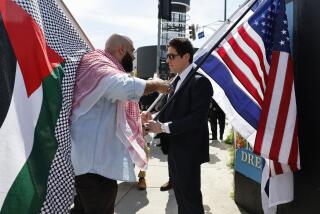Congo Rebels Form Coalition to Push Kabila From Power
- Share via
KIGALI, Rwanda — Rebels fighting Congolese President Laurent Kabila announced Wednesday a broad-based opposition coalition to lead an effort to drive him from power.
Speaking by telephone from Goma, the eastern city where they met Wednesday, rebel leaders said they were putting final touches on forming their alliance, which would be known as the Congolese Movement for Democracy.
They rejected Kabila’s charge that the uprising that began Aug. 2 against his 15-month rule was being driven only by Tutsis from the east, the Banyamulenge, who live near the Rwandan border.
They said alliance leaders were drawn from the east, west and south of the country, including Kabila’s home region of Katanga, near the southern border with Zambia.
“The objective will be to end all forms of dictatorship, to promote the process of democratization and national reconstruction and to promote peace and security in the Congo and the subregion,” a spokesman for rebel commander Jean-Pierre Ondekane said.
Ondekane’s forces and troops from the Tutsi-dominated Rwandan army helped Kabila depose former dictator Mobutu Sese Seko in May 1997 after a seven-month civil war that began in the east of what was then Zaire.
The rebels now accuse Kabila of concentrating state power in the hands of his family and members of his Balubakati clan, of corruption and mismanagement and of human rights violations.
Kabila has pledged to arm Congolese for what he predicts will be a long war.
“Weapons are being handed out to tens of thousands of people for them to defend their country and to defend their sovereignty,” Kabila told state radio in Kinshasa, Congo’s capital, on Tuesday.
Rebel spokesmen denied the Kabila government’s claim to have retaken the eastern city of Bukavu--the capital of South Kivu province, about 60 miles south of Goma--saying it would be the capital of their alliance.
Prominent names in the new front include Kabila’s former foreign minister, Bizima Karaha, longtime political activist Emile Ilunga, opposition leader Arthur Z’Ahidi Ngoma and exiled professor Wamba-dia-Wamba.
More to Read
Sign up for Essential California
The most important California stories and recommendations in your inbox every morning.
You may occasionally receive promotional content from the Los Angeles Times.












